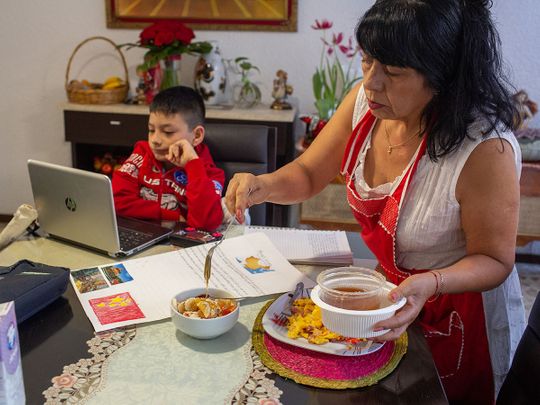
Dubai: The global COVID-19 pandemic has had a devastating impact on women’s livelihoods, with unpaid care work adding disproportionately to their burden, a hard-hitting global report released today, on the occasion of International Women’s Day, has revealed.
Speaking exclusively to Gulf News from Seattle ahead of its launch, Anita Zaidi, president of the US-based Bill and Melinda Gates Foundation’s Gender Equality Division, which partnered with the International Development Research Centre (IDRC) to issue the report, said, “Globally, COVID-19 has exacerbated gender inequality. The pandemic has exposed a lack of recognition on how much the world’s economy depends on women’s unpaid labour. Women today are currently spending more than 30 hours per week on childcare, which is almost like a full-time job.”

She said, “This is something we want to call attention to, so that governments looking to build out of the crisis can address the issue.”
What role has UAE played in global development?
“The UAE has been a big part of global development conversation and has been participating in a lot of global partnerships in health and development. It has a deep interest in developing countries and a lot of its sectors are staffed from these countries. This is an opportunity to step up,” she said, adding that the invitation to the upcoming Generation Equality Forum in Paris is open to all countries.
Why women should get priority for vaccines
As director of vaccine development at the Bill & Melinda Gates Foundation, Zaidi, said, “One of the sectors that is female-dominated (70 per cent) is healthcare. Women must get priority when it comes to getting vaccinated. As vaccines cover larger populations and economies open up, women, unfortunately cannot come back to work because of childcare. This is not an individual problem, we need to think about systemically.”
How does social distancing impact women?
According to the report’s findings, which were put together between July 2020 and February 2021, “The closure of schools and childcare facilities, combined with restrictions around individual movement and social distancing requirements, has removed institutional and community support for parents, including during their own normal working hours. With family members confined to the home, the amount of daily domestic work associated with caring for children has also intensified, and the burden is falling disproportionately on the shoulders of women—who were already performing up to three times more unpaid care work than men pre-pandemic.”
A mixed-methods approach was used, including a desk review of available evidence, key informant interviews and a virtual consultation with experts. Data collection and analysis took place between July 2020 and February 2021.
What activities does childcare cover?
The report explains how childcare encompasses activities essential not only for the wellbeing of households, but also societies and economies. They include supervisory care for children; domestic tasks such as cleaning, cooking and bathing children; time spent teaching, playing and reading to children; and the mental and emotional labour of setting household schedules and maintaining family relationships. In every country in the world, women perform a greater amount of unpaid childcare in the household compared to men, due to traditional gender roles and norms constructing childcare as “women’s work.”
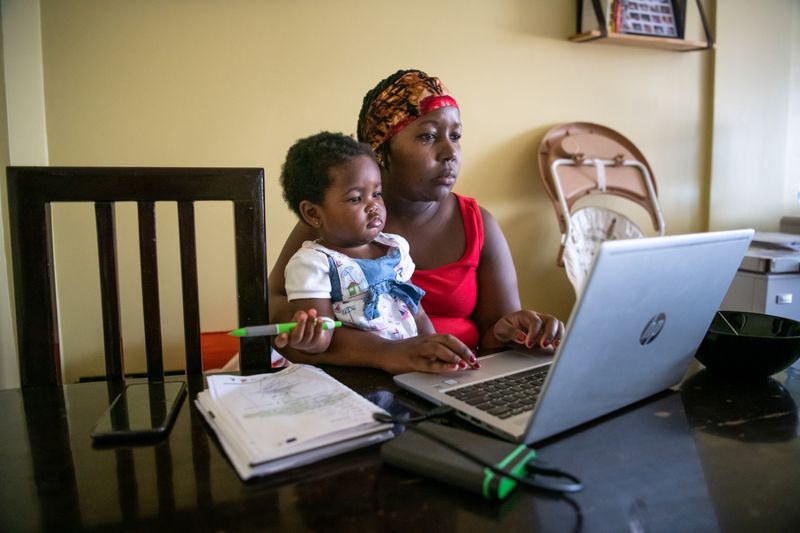
Despite its critical role in sustaining the “economically active” labour force on a daily and generational basis, the work of childcare is often not recognised as “real work”—it remains invisible, undervalued, and neglected in economic and social policymaking, the report states.
Other dimensions of unpaid care, such as eldercare, domestic work, or caring for the sick and disabled are also an important part of the conversation around COVID-19 response and recovery efforts, though not the focus of the paper.
How does homeschooling add to the tasks?
Where homeschooling or remote learning has been introduced in lieu of in-person classes, this is an additional childcare task that must be performed by households. Oxfam research in five countries finds that homeschooling due to school closures required less time for families in higher-income countries than in lower-income countries, likely because “parents in high-income countries can rely on technology for schooling and entertainment of their children, which isn’t as widely available in other contexts’’.
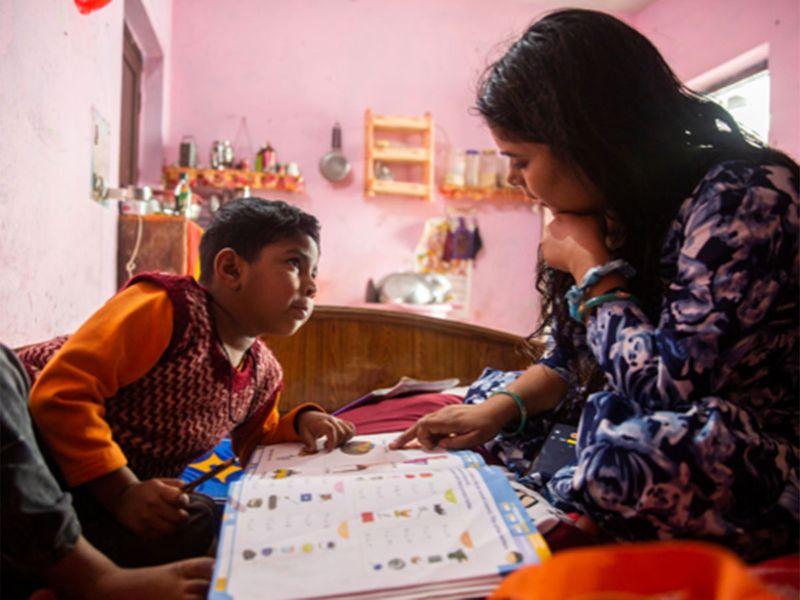
What about meal preparations?
The report says the amount of daily domestic work required to care for children has also intensified under COVID-19. Tasks related to meal preparation are “especially time-consuming as families now need to take all of their meals at home, compared to before the pandemic, when some members may have been out or at school during the day.
Who are the worst-hit women?
Groups worst affected include: women in informal employment with no paid leave, social protection or ability to work remotely; women living in rural areas with limited access to time- and labour-saving equipment, public services, and infrastructure; women living in poverty; single mothers; essential workers; adolescent girls; and women belonging to minority racial and ethnic groups.
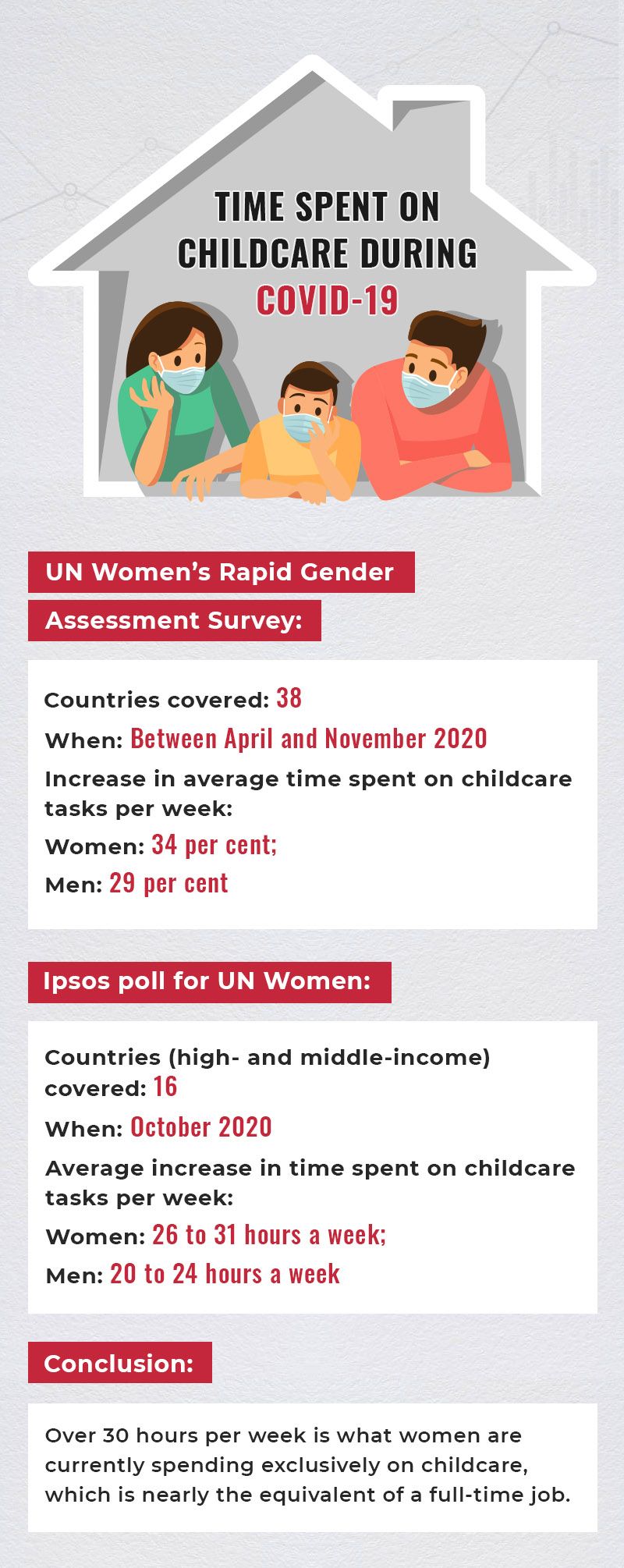
Are young girls in any way impacted?
Emerging global evidence suggests that the onset of the COVID-19 pandemic, and the subsequent shutdown of schools and childcare centres, have resulted in a dramatic increase in childcare at the household level, with women and adolescent girls being most affected, it adds.
Adolescent girls are also being pulled into providing increased amounts of childcare in their households. In the Ipsos poll, 64 per cent of parents noted greater involvement of daughters in unpaid care work due to COVID-19, compared to just 57 per cent of parents who noted greater involvement of sons.
Do women face domestic violence?
The report also says, “It is also important to acknowledge the situation faced by millions of households globally, where not only are men failing to help out during school and childcare closures, but they are also committing increased levels of domestic violence. As COVID-19 lockdowns persist, women are increasingly vulnerable to domestic violence as a result of social isolation, restricted movement, and economic insecurity.”
Have both women and men sacrificed careers?
According to the report, COVID-19 is exacerbating pre-existing gender labour force participation and earning gaps, as women take on the bulk of increased childcare responsibilities on top of their paid work. It quotes a LinkedIn Workforce Confidence Index, a survey of 2,254 professionals conducted in July and August 2020 in India, which finds that 31 per cent of working mothers surveyed are currently providing full-time childcare, compared to just 17 per cent of working fathers.
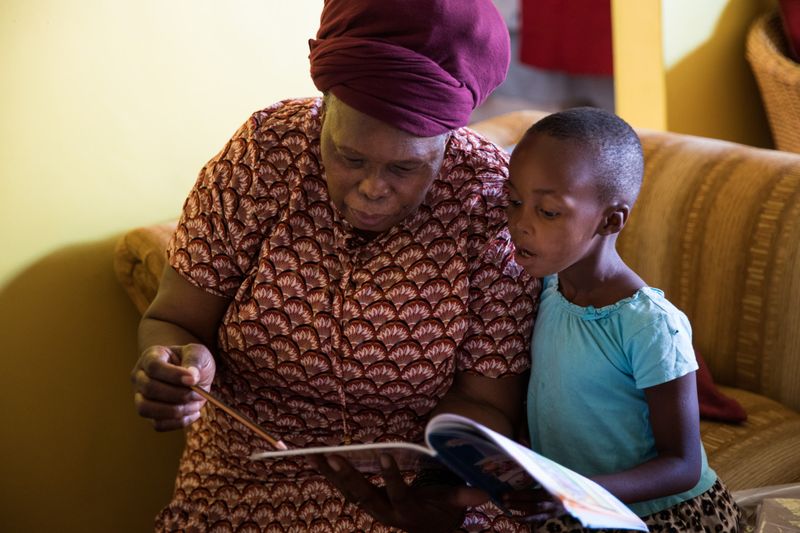
“Unable to rely on their usual childcare support networks due to lockdowns and social distancing requirements, 44 per cent of working mothers surveyed report working outside their normal business hours, and 47 per cent report experiencing increased levels of stress and anxiety. Similarly, Facebook’s Survey on Gender Equality at Home, which reached roughly half a million people across 208 countries and territories in July 2020, indicates that working mothers are facing significant setbacks to work as a result of increased care burdens during COVID-19.
Why are women being squeezed out?
The report’s answer: “Because they tend to be the lower income earners, it is predominantly women who are sacrificing their careers and being squeezed out of the labour force.”
It says data from ILO labour force surveys reveals a significant decline in employment in the second quarter of 2020 compared with the previous year, though with considerable variation across countries. This relative decline in employment is greater for women than for men in all countries, with only a few exceptions such as France, Israel and Mexico. This gap is partly because more women are exiting the labour force to care for children, and partly because women make up a larger share of workers in the sectors of the economy hardest hit by COVID-19: accommodation and food services; real estate, busines and administrative activities; manufacturing; and retail (ILO, 2020b). Women also represent a greater share of informal workers in these sectors — 42 per cent for women compared to 32 per cent for men, meaning their employment was less secure to begin with.








